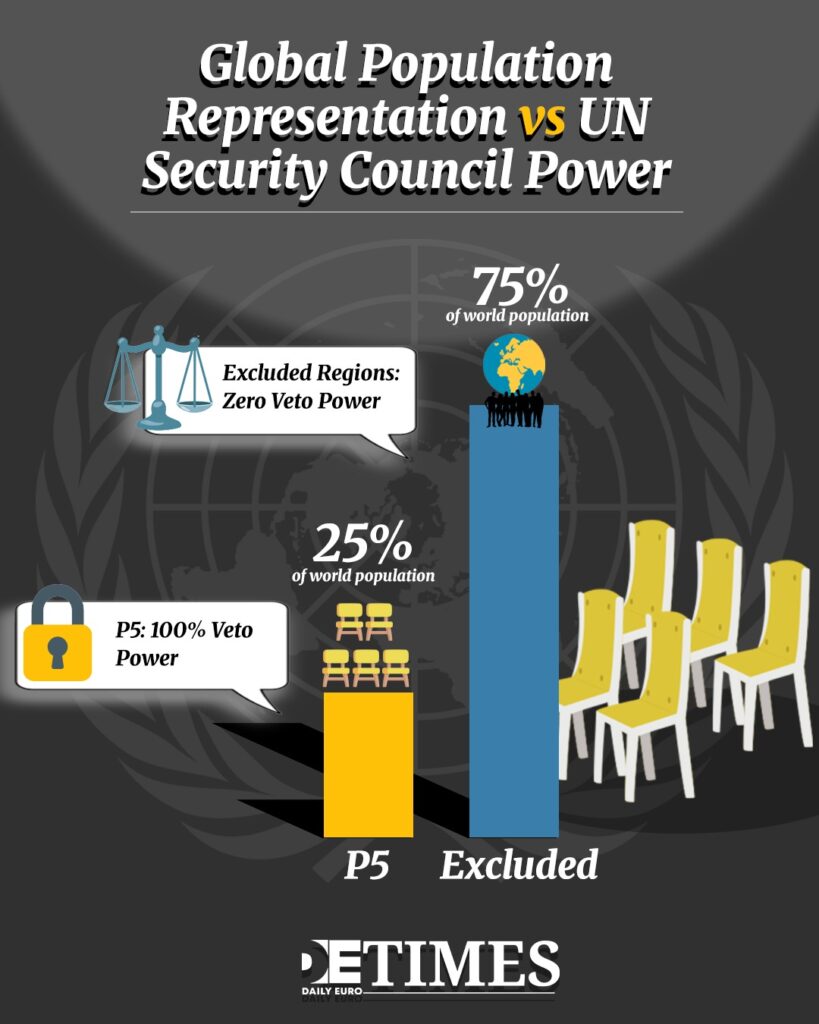As the UN Charter turns 80, the global order is in flux. Earlier this year, the United States again threatened to withdraw from the UN… after already quitting the Paris Agreement, the World Health Organisation, and the Human Rights Council under the Trump administration.
Coupled with Russia’s war in Ukraine, Israel’s assault on Gaza, and escalating great-power rivalry, the future of multilateralism appears more uncertain than ever.
A Backslide Foretold
We are living what Nelson Mandela once warned: the UN’s greatest challenge is the lack of independence and commitment among member states.
Today, many openly defy UN resolutions, default on treaties, and dismiss international norms. When the majority of members vote for ceasefires in Ukraine or Gaza only to be ignored by Moscow or Tel Aviv, multilateralism risks becoming a theatre of empty statements and inconsequential conferences.
The result is grim: full-scale wars, nuclear risks, genocides, tariff and trade wars – all symptoms of a tragic backslide in cooperation. Rising nationalism, protectionism, and authoritarianism are eroding the foundations of collective responsibility. The growing rivalry between the U.S. and China only compounds paralysis in global trade, diplomacy, and health governance.
The UN: Institutional Inertia
The UN remains overly dependent on Washington’s politics, while struggling to adapt to new challenges such as unregulated artificial intelligence and the destabilising power of social media.
The Security Council’s exclusion of Africa, Latin America, Asia’s middle powers, and small oceanic states further entrenches inequality and mistrust.
Meanwhile, veto powers are wielded with impunity. The United States and allies accuse the UN of bias; Russia and China block resolutions to shield their allies. The system drifts closer to irrelevance while regional bodies, such as the EU, AU, NATO, falter under crises from Ukraine to Sudan.

Europe, Africa, and Beyond
Even the EU — once Beethoven’s “multilateral vision” — has been shaken: Brexit, Türkiye and Ukraine accession debates, migrant crises, and democratic backsliding in its neighbourhood undermine cohesion. The African Union faces its own paralysis in the face of coups, civil wars, and disputes like the Nile waters conflict.
Reform or Replace?
Yet multilateralism has delivered in some areas: arms control, the Universal Declaration of Human Rights, global trade rules, and platforms for dialogue. It remains humanity’s best tool for collective security.
However, the Security Council’s structure, voting system, and veto power are relics of 1945.
Reform is overdue. The influence and demographic weight of India, Brazil, South Africa, Japan and others can no longer be denied. A robust restructuring of the UN, to reflect today’s realities, not yesterday’s victors, would enhance efficiency, accountability, and legitimacy.
Towards a New Multipolarity
If institutions refuse to evolve, a new multipolar order will inevitably emerge.
Adaptive governance, crisis-readiness, and equitable power-sharing could tame nationalism, restore trust, and ensure solidarity.
At 80, the UN must decide: reinvent itself or risk irrelevance.
The stakes are existential. We cannot wait for another hundred million lives lost before taking action. Whether through reform or replacement, the world needs a principled, predictable, and reliable order — one capable of confronting today’s geopolitical kerfuffles and tomorrow’s crises.
Read the Latest at DET!
The Language of War: Europe Braces for Iran-Israel Rerun
Economics Via Mediation: Gaza and Ukraine Wars Offer Europe Opportunities
Frozen Over, No More: Putin and Trump’s Meeting in Alaska






